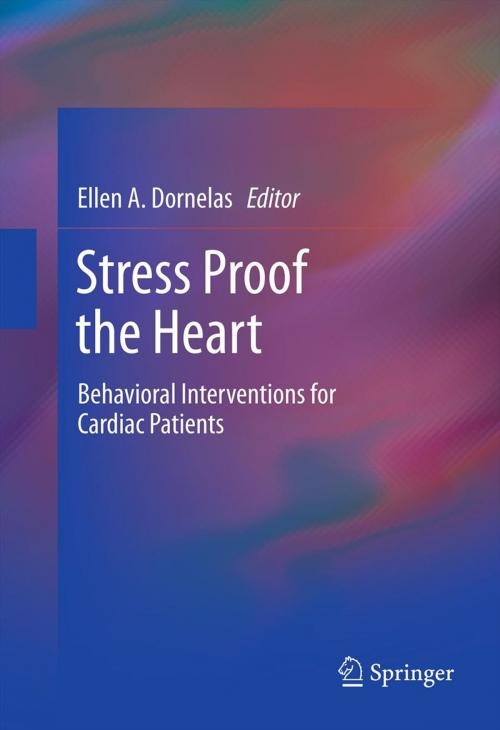Stress Proof the Heart
Behavioral Interventions for Cardiac Patients
Nonfiction, Health & Well Being, Medical, Specialties, Family & General Practice, Psychology, Applied Psychology| Author: | ISBN: | 9781441956507 | |
| Publisher: | Springer New York | Publication: | February 1, 2012 |
| Imprint: | Springer | Language: | English |
| Author: | |
| ISBN: | 9781441956507 |
| Publisher: | Springer New York |
| Publication: | February 1, 2012 |
| Imprint: | Springer |
| Language: | English |
Cardiovascular disease is a leading cause of death throughout the world. Chronic negative emotions such as depression and anxiety place cardiac patients at greater risk for death and recurrence of cardiovascular disease. In 2008 the editor published a book related to this topic, titled Psychotherapy with Cardiac Patients: Behavioral Cardiology in Practice (American Psychological Association). Aside from that book, there are very few resources specifically written for clinicians who treat psychologically distressed cardiac patients. Unlike other medical specialty areas such as oncology, the field of cardiology has been slow to integrate behavioral treatments into the delivery of service. Perhaps because the field has been largely defined and dominated by researchers, mental health clinicians are only starting to recognize behavioral cardiology as a viable arena in which to practice. There is a large void in the practitioner literature on behavioral cardiology. In a review of Psychotherapy with Cardiac Patients, Paul Efthim, Ph.D. wrote, "Her new book goes well beyond previous works by giving specific and detailed guidance about how to tailor psychological interventions with this variegated population." He added, "It would benefit from even more details about treatment approaches." This proposed volume goes beyond the editor’s previous volume by providing in-depth descriptions of behavioral treatments for distressed cardiac patients written by eminent leaders in behavioral cardiology. This book describes a wide range of behavioral treatments for the common psychologically based problems encountered by clinicians who treat cardiac patients. The book is organized as follows: Part I focuses on the most psychologically challenging and common presentations of cardiac diagnosis; coronary artery disease, arrhythmia, and heart failure. This section also includes a chapter on heart transplantation, which is a treatment, not a diagnosis, but a treatment that incurs profound psychological impact for the individual. In Part II, behavioral interventions for the general cardiac population are described. Mainstream therapies such as stress management, cognitive-behavioral therapy, and medical family therapy are described, along with approaches that have less empirical support but considerable practical significance such as personality-guided therapy and interventions aimed at altering type D personality traits. The literature in behavioral cardiology has a rich history of investigating maladaptive personality traits and thus it is important to include behavioral approaches that target personality in this volume. Part III focuses on common behavioral problems encountered by clinicians who work with this patient population. Most patients who seek psychological help do so because they perceive themselves to be stressed due to their job or overextended in all areas of their life. Other people with heart disease present with sleep problems and/or an inability to motivate themselves to exercise or quit smoking. There are many practical behavioral approaches that can be helpful for patients with these difficulties and these are detailed in this section of the book. The conclusion of the book focuses on how to integrate the behavioral treatments described in the preceding chapters into a comprehensive treatment model.
Cardiovascular disease is a leading cause of death throughout the world. Chronic negative emotions such as depression and anxiety place cardiac patients at greater risk for death and recurrence of cardiovascular disease. In 2008 the editor published a book related to this topic, titled Psychotherapy with Cardiac Patients: Behavioral Cardiology in Practice (American Psychological Association). Aside from that book, there are very few resources specifically written for clinicians who treat psychologically distressed cardiac patients. Unlike other medical specialty areas such as oncology, the field of cardiology has been slow to integrate behavioral treatments into the delivery of service. Perhaps because the field has been largely defined and dominated by researchers, mental health clinicians are only starting to recognize behavioral cardiology as a viable arena in which to practice. There is a large void in the practitioner literature on behavioral cardiology. In a review of Psychotherapy with Cardiac Patients, Paul Efthim, Ph.D. wrote, "Her new book goes well beyond previous works by giving specific and detailed guidance about how to tailor psychological interventions with this variegated population." He added, "It would benefit from even more details about treatment approaches." This proposed volume goes beyond the editor’s previous volume by providing in-depth descriptions of behavioral treatments for distressed cardiac patients written by eminent leaders in behavioral cardiology. This book describes a wide range of behavioral treatments for the common psychologically based problems encountered by clinicians who treat cardiac patients. The book is organized as follows: Part I focuses on the most psychologically challenging and common presentations of cardiac diagnosis; coronary artery disease, arrhythmia, and heart failure. This section also includes a chapter on heart transplantation, which is a treatment, not a diagnosis, but a treatment that incurs profound psychological impact for the individual. In Part II, behavioral interventions for the general cardiac population are described. Mainstream therapies such as stress management, cognitive-behavioral therapy, and medical family therapy are described, along with approaches that have less empirical support but considerable practical significance such as personality-guided therapy and interventions aimed at altering type D personality traits. The literature in behavioral cardiology has a rich history of investigating maladaptive personality traits and thus it is important to include behavioral approaches that target personality in this volume. Part III focuses on common behavioral problems encountered by clinicians who work with this patient population. Most patients who seek psychological help do so because they perceive themselves to be stressed due to their job or overextended in all areas of their life. Other people with heart disease present with sleep problems and/or an inability to motivate themselves to exercise or quit smoking. There are many practical behavioral approaches that can be helpful for patients with these difficulties and these are detailed in this section of the book. The conclusion of the book focuses on how to integrate the behavioral treatments described in the preceding chapters into a comprehensive treatment model.















